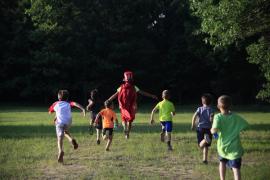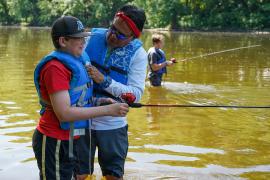Ah, the annual review at work. Or, in our camp settings, the end-of-session/summer evaluation. What a wonderful time for me, as a supervisor, to finally tell a staff member how I think they generally did for the entire time period prior to the evaluation (at least based on the few times I saw them in action and what I heard from others). Finally, a chance to tell this staff member that even though they were never Counselor of the Week or an All-Camp Event Team Captain, they did some things well. And even if I can’t remember exactly what things those were, in general, I feel like I’d love to have them back next summer. That is, of course, if they want to come back.
So many times a day a staff member does something great, and so many times we don’t take time to acknowledge that behavior — we wait until the formal check-ins, when the details are forgotten and a general sentiment is the most we can give. The same goes for each time in a day that a staff member does something that was only good, or even sub-par, and we don’t say something to help them improve. Why do we pass up these opportunities?
Is it because . . .
- A) We don’t know how to say it?
- B) We don’t know what to comment on?
- C) Our staff are not expecting to receive constructive criticism?
- D) We don’t feel like we have time?
- E) All of the above?
Survey data I collected at multiple time points (beginning and middle of) last summer, from 100 staff across a network of camps, showed the importance of staff feeling supported (not just camp leaders thinking they support their staff). When these staff were “Feeling supported by my direct supervisor” early in the summer, it led to them being more enthusiastic about the work they were doing at camp. These feelings of support also led to a stronger “Likelihood to return next summer.” In fact, support from one’s supervisor had a greater positive impact on staff members’ likelihood to return next summer than did “Feeling supported by camp” more generally. In other words, the data suggests that staff members receiving feedback directly from their supervisor has a greater positive impact than being recognized for their efforts by camp in more general ways (e.g., Counselor of the Week).
Now you know why it’s important, so let’s break down some of the barriers:
A) We don’t know how to say it.
We can begin with comfort in delivering feedback. If you don’t work in a camp where there is a culture of frequent feedback, then going up to a staff member and giving them feedback (be it praise or constructive criticism) can be uncomfortable. To create a culture where giving feedback is the norm, you need to practice. Practice should start with low-stakes opportunities, such as during staff training, or even during conversations before staff arrive at camp, when there are no campers around yet. You can gradually cultivate these positive habits by giving yourself, and your staff, time to learn their own style and comfort zone for providing feedback.
B) We don’t know what to comment on.
It is very difficult to give feedback to someone if you don’t know about what to give feedback. You really have two options.
- Option #1 is about a behavior. Behaviors can fall into a variety of categories: job performance, teamwork, leadership, conflict management, etc. This option is especially recommended for most, if not all, times when discussing constructive criticism.
- Option #2 is to give feedback about the person’s character. Character can include observing actions that demonstrate kindness, compassion, honesty, respectfulness, humility, etc. This option is recommended for when you are providing praise.
C) Our staff are not expecting to receive constructive criticism.
The receipt of feedback, especially constructive criticism, can be a jarring experience if you are not used to receiving such feedback. Here again, is where practice can make a huge difference. Practicing giving and receiving constructive criticism among one’s peers, when there are no supervisees and/or campers around, can set a clear expectation around what this will feel like once staff members are in the full swing of the summer. It is important to emphasize that such criticism is for the staff member’s benefit in order to shift the interpretation from demeaning to developmental. Ultimately, constructive criticism can be viewed by staff members as being as valuable as praise.
D) We don’t feel like we have time.
You actually might not have time to give meaningful, individual feedback if it isn’t a priority for you and your staff supervisors. Creating a staff culture that prioritizes feedback, though, takes time — time to practice observing and capturing the specifics, time to see your staff in action, and time to give meaningful feedback that fosters growth and development. Making feedback a priority can lead to more engaged staff who are more likely to return to camp and continue being part of your community.
E) All of the above. Great news — if you made it here, you already learned strategies for overcoming each barrier. Time to start practicing!
We welcome your feedback on the this and the other two recent Project Real Job (PRJ) ACA blog posts: The Value of Asking Your Staff and One Reason Camp Is a Unique Professional Experience. Also, be sure to check out the main page for Project Real Job for great resources your camp can use on the professional value of working at camp!
Daniel Shore is a researcher and consultant with an MA (and now finishing his PhD) in workplace psychology. He conducts research across numerous settings, from cybersecurity teams to summer camps, and turns data into action by (1) facilitating training experiences, (2) conducting feedback focus groups, and (3) creating professional development and training curricula. In the camp world, Daniel combines his ten summers of experience as a staff member, unit supervisor, and director of staff and leadership development with his research expertise to help camps strategically train staff to enhance the camp staff experience. Daniel is looking to work with camp leaders who believe what he believes: to have a great camp with happy campers, you need happy counselors.

Feel free to email Daniel with any thoughts, questions, or interest in being a partner through research and training workshops at [email protected].
Photo courtesy of Camp Gray in Reedsburg, Wisconsin.
The views and opinions expressed by contributors are their own and do not necessarily reflect the views of the American Camp Association or ACA employees.



